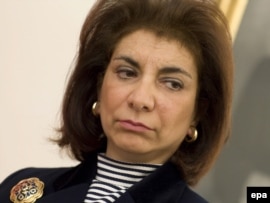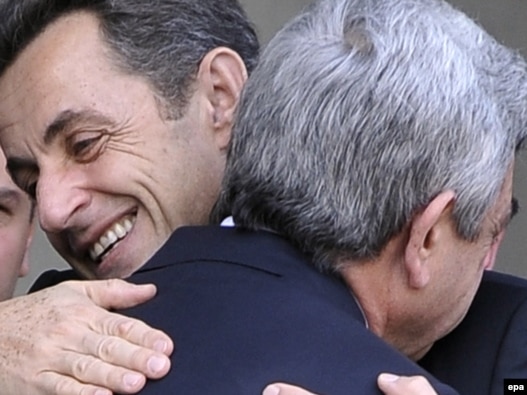 Turkish Ambassador to Sweden Zergun Koruturk said Swedish lawmakers ”acted thinking that they were historians rather than parliamentarians, and it’s very, very unfortunate.”
Turkish Ambassador to Sweden Zergun Koruturk said Swedish lawmakers ”acted thinking that they were historians rather than parliamentarians, and it’s very, very unfortunate.”
The parliament narrowly approved the resolution on March 11 despite opposition from the government in Stockholm.
Ankara immediately recalled its ambassador to Sweden over what it condemned as a resolution made for “political calculations.” And it said its Prime Minister, Recep Tayyip Erdogan, was canceling a visit to the Scandinavian country planned for next week.
Sweden’s move comes just a week after Ankara recalled its ambassador from Washington following a U.S. congressional panel’s decision to approve a similar “genocide” resolution.
“I’m very disappointed,” said Turkey’s ambassador to Sweden, Zergun Koruturk. “Unfortunately the parliamentarians — I think they acted thinking that they were historians rather than parliamentarians, and it’s very, very unfortunate. This is going to have drastic effects on our bilateral relations and I don’t think it will be compensated in a short time.”
Genocide Issue
Armenians say up to 1.5 million of their kin were killed by their Ottoman Turk rulers in 1915 in a planned campaign of extermination.
Turkey accepts that many Armenians were killed, but it rejects the term “genocide,” saying the death toll has been inflated and that many Turks were also killed during a period of civil war and unrest.
Sweden now joins a growing list of countries recognizing the massacres as genocide, alongside Russia, France, and Switzerland among others.
But the March 12 vote was razor-thin. It passed by a one-vote margin thanks to several lawmakers from the ruling center-right coalition who broke ranks to back the measure.
Conservative legislator Gustav Blix and Hans Linde of the Swedish Left Party argued each side of the debate, with Blix saying: “This is not something that should be decided by parliament. It is a question for historians and not for politicians to decide on.”
Linde responded that “If the victims are not acknowledged and get their sufferings proved true, this trauma may go on for generations.”
Complicating Normalization?
Some worry that the vote could complicate not just bilateral relations between Turkey and Sweden — which has been a firm backer of Ankara’s long-standing bid to join the European Union.
Sweden’s foreign minister, Carl Bildt, said it would have a knock-on effect on the halting process now under way to normalize ties between Turkey and Armenia.
“I’m very concerned, I am worried about the consequences,” Bildt said. “I got a report from Turkey that the opposition now wants the normalization of the contacts between Armenia and Turkey to stop. I think this politicizing of history risks making reconciliation more difficult.”
Ankara has also made similar warnings. In the latest, an official in Turkey’s ruling party said before Sweden’s vote that Ankara was extremely unlikely at this point to ratify its fence-mending protocols with Armenia.
Suat Kiniklioglu, deputy chairman of the Justice and Development Party, told RFE/RL’s Armenian Service that Turkish ratification had been made “more difficult” by the U.S. resolution.
But Swedish lawmaker Goran Lennmarker, told RFE/RL that he believed the reconciliation process would not be jeopardized, “irrespective of what happened” in Sweden or the United States.
Lennmarker is chairman of the Swedish parliament’s Foreign Affairs Committee and the special representative of the OSCE’s Parliamentary Assembly for Nagorno-Karabakh, a territory disputed by Armenia and Azerbaijan and site of a war in the 1990s.
“There should be ratification in the [parliament] of Turkey of the agreement as soon as possible, they don’t’ have to wait for anything else, not least a solution on Nagorno-Karabakh,” Lennmarker said.
RFE/RL’s Armenian Service contributed to this report. With agency reports








 France — President Nicolas Sarkozy (L) bids farewell to his Armenian counterpart Serzh Sarkisian at Elysee Palace in Paris, 10Mar2010
France — President Nicolas Sarkozy (L) bids farewell to his Armenian counterpart Serzh Sarkisian at Elysee Palace in Paris, 10Mar2010
